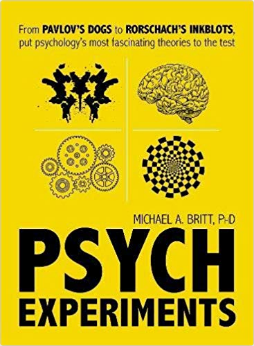One of the reasons that psychology is so compelling to people is that certain aspects of psychology feel more relevant to daily life than other sciences like biology and chemistry. In fact, some psychology experiments can be informally replicated with pets, students, or friends. In this article I will briefly present a book that discusses many classic psychology experiments and includes instructions on how the reader can try them themselves.
Note: The links below are affiliate links. You can read our about page to learn more about these links. At the end of the day, they’re pretty much the same as any other links to Amazon.
A great book on DIY psychology experiments
This book from Michael A. Britt, a psychology professor and podcast host, is an excellent resource for anyone who wants to learn about psychology experiments that they can do outside of a lab.
Britt, M.A. (2016). Psych Experiments: From Pavlov’s dogs to Rorschach’s inkblots, put psychology’s most fascinating studies to the test. Avon: Adams Media.
Psychology replications
This book partially serves as an overview of the history of psychology. However, it also partially serves as a handbook for aspiring amateur psychologists (or a professor trying to engage their students with hands-on psychology experiments). The book includes several “conceptual replications”, which are attempts to replicate the concepts of classic experiments instead of straight replications. Some of these concepts are:
- Cognitive dissonance
- Social roles
- Learned helplessness
- Rorschach inkblots
- Detecting lies
- Behavior modification
Ethical considerations
Because this book suggests psychology experiments that the reader can run themselves, it puts an important focus on ethical considerations. The ethics of experimentation are a crucial part of psychology, even in the case of amateur experiments like this. This is one of the advantages of the fact that the author of this book is an experienced psychologist. In other words, this book is not only helpful for learning about classic psychology experiments, but also helpful for learning about the ethical considerations that must accompany any such experiments.
Extremely accessible
Another advantage of this book is that it was written to be extremely accessible, and is not weighed down with in-field terminology. This means that people who are not extremely knowledgeable about psychology can still get everything out of this book. Professors looking for a book for their students should not despair, though, as the important concepts (like independent and dependent variables) will be immediately recognizable, even if the same terms are not used.
Wrapping up
Whether you want to try some psychology experiments for yourself or you want to have your students try them, this book is an excellent resource. The author is extremely credible, so you do not have to worry about the accuracy of the information contained within. This book is a great way to learn about important historical psychology experiments and see how the core concepts still hold up today.
